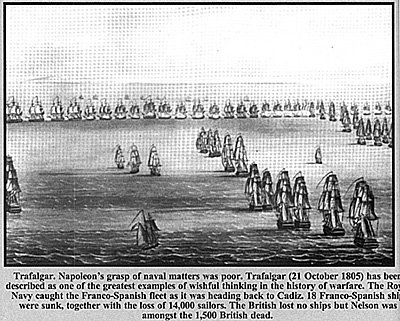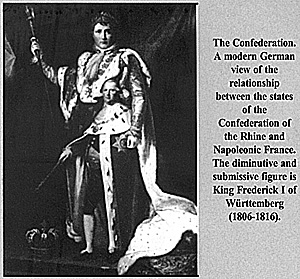Napoleon Man of War
The Third Coalition
By John Cook, UK
| |
The formation of the Third Coalition was prompted by different and largely disparate motives in Russia and Austria but, by now, even the most undiscerning continental governments realised that Napoleonís intentions were clear enough - total French political and commercial hegemony in Europe to the exclusion of all others. Russia and Britain were uneasy bedfellows but essential trading partners. By the late 19th Century Russia had become a significant commercial power, but she had little industry in comparison and depended largely on imports for manufactured goods. Her prosperity relied on the exports of raw materials for which Britain was the principal customer. Pitt returned as Prime Minister in 1803 and in 1804 Britain approached Tsar Alexander I with a view to an alliance against France. Russia, in common with all continental powers, was already concerned at Napoleonís apparently insatiable appetite for territorial acquisition but there were specific factors leading to Russian hostility.
2. The belief that Napoleon intended to establish an independent state in Poland. 3. The execution of the Duke of Enghien. Alexander had intentions of his own in the context of Poland but was wrong in his assessment of Napoleonís motives in that region. In order to retain Polish loyalty, Napoleon was content for the Poles to believe that he planned to help realise Polish aspirations for an independent state. He actually had no intentions of the sort - Poland was to be a French vassal state like any other. Alexander was particularly infuriated by Napoleonís abduction of the Duke of Enghien from Baden and subsequent execution. It is not appropriate to digress here into a discussion of the Dukeís guilt or innocence, though there is little if any evidence to support the former, merely to describe what motivated Alexander. Britain did not have sufficient troops available to send meaningful land forces against France without exposing Britain to the threat of invasion and, even if she had, had neither the opportunity to land them nor the logistic capability to sustain them in a hostile western Europe with any realistic hope of success. Her contribution was a naval and financial one. Supporters of Napoleon usually cry Ďfoulí in this last context as if seeking allies and supporting them is somehow underhand. The argument escapes me entirely. Did not Napoleon have allies? Indeed he did, and ones which had far less choice in the matter and were ruthlessly exploited in the interests of what was to become the Grand Empire. Austria was a more reluctant partner but she too had serious concerns about Napoleonís aggressive expansionism.
2. Formation of the Italian Republic from the Cisalpine Republic of which Napoleon was President. 3. The subsequent formation of the Kingdom of Italy from the Italian Republic of which Napoleon was crowned King. 4. The annexation of Savoy, a mainland Sardinian possession adjacent to Piedmont. The consolidation of French gains and annexations in Italy and Germany prompted the Austrians to conclude a defensive treaty with Russia in 1804, in which Britain had no part. The formation of the Kingdom of Italy, of which Napoleon was crowned King on 26 May in Milan, was the final act that prompted Austria to join the coalition. In August 1805 Austria made a formal protest to France over Napoleonís annexation of Savoy and concluded an alliance with Russia and Britain. The aims of the Third Coalition were essentially the same as previous ones - to return France to the borders of 1791. There was no suggestion of removing Napoleon from his newly created Imperial throne. Napoleon, with a fully mobilised army on the Channel, was able to move French forces to the Rhine in September with unprecedented speed based on pre-emptive plans made in August. As previously, allied co-ordination was poor, not least because their war aims and national interests did not necessarily coincide, and the Austrians, who believed that the main theatre would be Italy, were defeated at Ulm on 20 October before the Russians were able to give them support. The Russians were defeated at Austerlitz on 2 December in what is generally considered to be Napoleonís military masterpiece. Russia again abandoned the coalition and the Austrians were isolated. The Treaty of Pressburg was concluded with Austria on 26 December 1805 -- it was a humiliation. Austria not only lost her remaining possessions in Italy, Venice, Istria and Dalmatia, but Austrian territories in Swabia and the Tyrol were awarded to the French vassal states of Bavaria, Baden and WŁrttemberg. In addition an indemnity of 118 million francs was levied.
Napoleon also assumed that his navy would have the same psychological advantage over the Royal Navy that he credited his army with over the Continental allies - the reverse was the case. Nevertheless, despite the ultimate disaster at Trafalgar, Villeneuve did successfully lure the Royal Navy to the Caribbean and for a week in March 1805 the Channel opposite Bolougne was sufficiently unguarded for a crossing to be a possibility. This was Napoleonís one and only opportunity for a successful invasion. Napoleon had, however, decided to abandon plans for an invasion of Britain in September and the Grande Armťe had left Boulogne a month before the unfortunate Villeneuve encountered the Royal Navy at the approaches to the Straits of Gibraltar, and was defeated in a battle fought for no purpose. From 1805 the seeds of Napoleonís Grand Empire in Europe began to flower. His victory at Austerlitz enabled him to redraw the map of Europe. He created Kings in Bavaria and WŁrttemberg and together with Hesse-Darmstadt and other principalities formed a group of vassal states whose foreign policy and defence was decided by France.
It was also the point where a much more authoritarian Napoleonic state started to emerge. Minor resistance to the Confederation in parts of the territory, particularly Cleves, before it was absorbed into the artificial Kingdom of Westphalia after Tilsit, and in Hesse, was met with harsh and arbitrary measures before they were put down. Napoleon was certainly no different in terms of authoritarianism from any of his peers and whatever his propaganda might have said in the context of peace, he was emerging as a the head of a state who was nothing without his army, as pointed out by Carnot, and whose raison díetre was war. Eventually the Confederation comprised all of Germany except Prussia and Austria and comprised states ruled largely by old regime princes, opportunists all who had thrown their lot in with Napoleon, although it can be argued that they were also realists and by doing so avoided absorption into a greater France. More Napoleon Man of War Back to Table of Contents -- First Empire #56 Back to First Empire List of Issues Back to MagWeb Master Magazine List © Copyright 2001 by First Empire. This article appears in MagWeb (Magazine Web) on the Internet World Wide Web. Other military history articles and gaming articles are available at http://www.magweb.com |
 The only bright spot for the coalition was the defeat of the Franco-Spanish fleet at Trafalgar on the day following the Austrian surrender at Ulm and it is worth pointing out that the defeat at Trafalgar was a direct result of Napoleonís lack of comprehension of naval warfare. The naval campaign which Napoleon ordered admirals Villeneuve and Ganteaume to conduct on 2 March 1805, in concert with Franceís then Spanish ally, was intended to either destroy or lure the Royal Navy away so that a Channel crossing might take place. It took no account of weather and the vagaries of the sea and assumed that Nelson and the blockading Royal Navy squadrons would conform to his plan.
The only bright spot for the coalition was the defeat of the Franco-Spanish fleet at Trafalgar on the day following the Austrian surrender at Ulm and it is worth pointing out that the defeat at Trafalgar was a direct result of Napoleonís lack of comprehension of naval warfare. The naval campaign which Napoleon ordered admirals Villeneuve and Ganteaume to conduct on 2 March 1805, in concert with Franceís then Spanish ally, was intended to either destroy or lure the Royal Navy away so that a Channel crossing might take place. It took no account of weather and the vagaries of the sea and assumed that Nelson and the blockading Royal Navy squadrons would conform to his plan.
 1805 was also the point where traditional French foreign policy became Napoleonís own. The creation of the Confederation of the Rhine, of which Napoleon was Protektor, was a massive error of judgement because it meant the dissolution of the Holy Roman Empire of German Nations, which in turn meant that peace with Prussia, Russia and especially Austria, so adroitly and continually pointed out by Tallyrand, was increasingly unlikely.
1805 was also the point where traditional French foreign policy became Napoleonís own. The creation of the Confederation of the Rhine, of which Napoleon was Protektor, was a massive error of judgement because it meant the dissolution of the Holy Roman Empire of German Nations, which in turn meant that peace with Prussia, Russia and especially Austria, so adroitly and continually pointed out by Tallyrand, was increasingly unlikely.